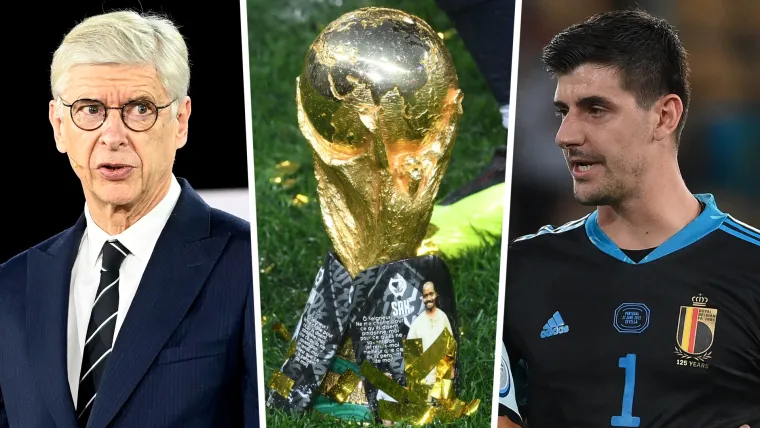Belgium duo Romelu Lukaku and Eden Hazard were forced to pull out of last Sunday's Nations League third-placed play-off with Italy because of "muscle overloads".
Thibaut Courtois was fit to play – but he certainly was not happy about it.
"This is just a money game and we have to be honest about it," the goalkeeper told Sky Sports after Belgium's 2-1 loss in Turin. "We just play it because it is extra money for UEFA and it is an extra game on TV.
"OK, for us, it's a good game because it's against Italy and, for Italy, it's a good game because it's against Belgium, but look how much both teams changed their players – if we had both been in the final, there would have been others playing.
"This just shows that we play too many games. Next year, we have a World Cup in November, so we maybe have to play until the latter stages of June again. We will get injured but nobody cares about the players any more.
"After a long season, we will have to play four games in the Nations League again, we will have two weeks' holiday and that's not enough for players to be able to continue playing 12 months at the highest level.
"If we never say anything, it will always be the same. UEFA can be angry about other teams making a Super League but they don't care about the players; they just care about their pockets.
"You hear that they want to put a European Championship and a World Cup every year. When will we get a rest? Never. So, in the end, top players will get injured all the time and that's the end of it. It's something that should be much better and better taken care of. We're not robots."
Courtois' passionate plea unsurprisingly overshadowed the game itself.
🗣🎙 “We will get injured, and nobody cares about the players anymore."
— FIFPRO (@FIFPRO) October 11, 2021
Referring to plans for the global football calendar, @ThibautCourtois eloquently points out that player welfare is falling second to commercial interests.
🎥 @SkySportsNews pic.twitter.com/2SOQeP3c2Q
FIFPro, the global union for professional players, was quick to voice its support, arguing that the Real Madrid No.1 deserved praise for eloquently pointing out "that player welfare is falling second to commercial interests".
Meanwhile, Football Supporters Europe (FSE), an independent, democratic and non-profit association of fans, added that "an expanded Champions League and biennial World Cup will make this situation worse. Something has to give."
We certainly appear to be at a crucial juncture in football history, with a new international calendar set to come into effect in 2024.
However, it must be acknowledged that not everyone felt that Courtois, or indeed any top player, was in a position to complain about being placed under more physical and mental strain.
"He's talking nonsense," former Netherlands international Rafael van der Vaart told NOS Sport. "You play football, you earn and you have six months of vacation. If you want to be a footballer, you will have an intense programme of various appointments. We've all been there.
"Playing games is the most beautiful thing there is. Courtois is whining. And then, he's a goalkeeper..."
UEFA, meanwhile, pointed out that the third-placed play-off took place within a designated international window, meaning that it hadn't added a fixture to either country's schedule.
Certainly, the chances are that both Italy and Belgium's footballing federations would have played a friendly in this period had they not had a World Cup qualifier lined up, and UEFA can rightly claim that the Nations League is already proving a far more entertaining, meaningful and useful alternative to the former.
However, Courtois raised far more important points than the dubious merits of third-place play-offs. Indeed, hardly any of the game's major stakeholders would disagree with his assertion that the international football calendar is in dire need of an overhaul. It is just that their motives and methods for doing so vary wildly.
The idea of staging the World Cup every two years was first raised by former FIFA president Sepp Blatter in 1999.
"The existing four-yearly tournament is out of date," the Swiss argued. "It dates from the 1930s when teams chugged from one continent to another on ships."
Blatter felt that continental competitions, such as the European Championship, could be held in between, in uneven years, and serve as qualifiers for the World Cup.
His proposal was supported by the likes of United States Soccer Federation president Robert Contiguglia, who argued that the World Cup's more regular rotation would boost his nation's hopes of staging another edition before 2014.
Blatter's idea failed to garner sufficient support among FIFA's members at the time, but it was raised again in 2018 by CONMEBOL president Alejandro Dominguez. "If we stay with this format," the Paraguayan said, "many players will not play more than two World Cups."
Arsene Wenger used the same reasoning when he made a new push for a biennial World Cup in March of this year in his role as FIFA's head of Global Development, arguing that players deserve more chances to play in the game's premier competition.
And this time around, there is serious momentum behind the project.
🗣️ "The perception of time has changed and the younger generation wants to be entertained much more."
Arsene Wenger gives his reasons for backing the biennial World Cup, saying that players want to play big games more regularly. pic.twitter.com/HYaOyRelip — Sky Sports News (@SkySportsNews) October 15, 2021
At May's FIFA congress, the Saudi Arabian Football Federation (SAFF) formally requested that "a feasibility study be carried out on the impact" of staging both the men's and women's World Cups every two years.
"We believe the future of football is at a critical juncture. The many issues that football has faced have now been further exacerbated by the ongoing Covid-19 pandemic," SAFF president Yasser Al-Misehal stated.
"It is time to review how the global game is structured and to consider what is best for the future of our sport. This should include whether the current four-year cycle remains the optimum basis for how football is managed both from a competition and commercial perspective."
What FIFA president Gianni Infantino termed "an eloquent and detailed" proposal was then put to a vote, and 166 of the 211 national federations voted in favour of the study.
Infantino insisted that the game's governing body would make the sporting merit of a biennial World Cup "the priority – not the commercial element". However, his words were met with scepticism within certain quarters of the game.
Indeed, Tariq Panja of the New York Times has previously described the World Cup to Goal as "FIFA's biggest cash cow", while 'The Price of Football' author and podcast presenter Kieran Maguire told us last December that "FIFA loses money three years out of every four. It only makes money in World Cup years. When the World Cup is not on, money is not coming in; it's going out."
Even the ongoing row over the creation of a European Super League (ESL) is viewed by industry insiders as a massive, behind-the-scenes battle between FIFA and UEFA for control of the lucrative club game.
Despite the claims of La Liga chief Javier Tebas that Infantino was behind the attempted breakaway, FIFA has denied involvement and publicly supported UEFA in their war with the 12 rebel clubs.
UK football fans don’t want a World Cup every two years. 64% are opposed to FIFA’s plans, with 40% 'strongly' opposedhttps://t.co/h5ZWDCEIRa pic.twitter.com/fePakw2fwF
— YouGov (@YouGov) September 10, 2021
Infantino has also insisted that a biennial World Cup will not mean double the money for FIFA, but there are obvious and significant financial advantages, given the event usually generates at least $6 billion (£4.4bn) in revenue for the governing body.
However, after being entrusted with the responsibility of coming up with a plan for a new international calendar, Wenger claimed that his support of a tournament every two years would benefit the game as a whole – and not just his employers.
"Today's calendar is outdated," the former Arsenal boss said, echoing Blatter. "We want to organise it in a more efficient way. The current four-year cycle [for the World Cup] was established in 1930, yet 133 countries have never been to one."
UEFA immediately questioned this logic, arguing that staging a major tournament every year would do nothing to close the gap between the world's strongest sides and its weakest.
Indeed, it claimed it could have the opposite effect, citing the risk of "the erosion of sporting opportunities for the weaker national teams by replacing regular matches with final tournaments".
Wenger countered that a biennial World Cup would allow FIFA to invest more money in grassroots football in its smallest and poorest member states, thus boosting their qualification hopes over time.
However, it has been alleged that Infantino is merely attempting to strengthen his power base by promising his supporters more money, having already increased the size of the 2026 World Cup by 16 teams and 16 more games in the first year of his presidency.
FIFA, though, insists that younger football fans from developing markets and regions are in favour of a World Cup every two years, citing the results of an online survey conducted by IRIS and YouGov in July 2021 that polled 23,000 people in 23 countries across six confederations.
"Based on initial results," FIFA stated, "the following conclusions can be drawn:
"The majority of fans would like to see a more frequent men's FIFA World Cup; of this majority, the preferred frequency is biennial; there are considerable differences between the so-called traditional markets and the developing football markets; and younger generations in all regions are more open and interested in change than older generations."
FIFA's conclusions, and the significance of their survey, have already been questioned.
As well as claiming that the numbers released had, in reality, showed that only 30 per cent of those polled who had "expressed an interest in football" were in favour of a biennial World Cup, FSE also posted an open letter co-signed by 63 supporters groups from across the six federations who were against the proposal.
"We do not want or need more World Cups," the statement declared.
🗣 “We do not want or need more World Cups.”
— Fans Europe (FSE) (@FansEurope) September 13, 2021
🌍 Updated list of national fans’ groups from across the 6 football confederations who’ve issued a joint statement against the 2 Year World Cup. New signatories from Argentina, Ecuador, USA, & Scotland.
#️⃣ #No2YearWorldCup pic.twitter.com/B44jiZpG11
UEFA and CONMEBOL, in spirt of Dominguez's previous support, took a similarly strong stance, with UEFA president Aleksander Ceferin even suggesting both federations could boycott the tournament. UEFA was also particularly concerned by the impact biennial World Cups would have on women's football.
"The fast-paced nature of the (so far) very selective consultation process and all-but agreed proposals have not allowed a careful reflection on what is in the best interests of the future development of women’s football or adequately assessed the possible irreversible consequences such a change might entail," read a statement co-signed by UEFA, the European Club Association (ECA), the Women's Super League and nine other domestic women's leagues.
It was alleged that "adding further congestion to the men’s international match calendar with more men’s final tournaments" would "hamper the visibility and growth of women’s youth, club and national team competitions and women’s domestic leagues around the globe."
Meanwhile, England women's team manager Sarina Wiegman asked, "When you have all these tournaments [World Cups, Olympics and Euros] every year, when are the players going to get some rest? When are they going to recover from a very intense football year, every year?"
Wenger's proposal has several high-profile supporters, though.
FIFA invited 80 former players, including Brazil legend Ronaldo, to a meeting in Doha at the start of September and, according to Danish goalkeeping legend Peter Schmeichel, not one "disagreed on the greater frequency of the World Cup".
However, several high-profile non-attendees were not quite as supportive. Thierry Henry, one of Wenger's former charges, told CBS Sports, "I played four World Cups and [three] Euros and I came out of them shattered mentally.
"And it’s not about the games I played in it, it’s the preparation for the World Cup, coming back from the World Cup after a season at your club. So, if you play that every two years, mentally it’s tough for a player."
On the same panel, ex-Liverpool defender Jamie Carragher added, "My big problem is: why are we trying to get ex-players to support it? We aren’t going to play in it. Ask the players who will play in it now.
“Ask [Marco] Verratti. Ask [Giorgio] Chiellini. Ask [Kylian] Mbappe. Ask Mo Salah. They are the ones you need to get on board... not former players. Not Ronaldo. Not Peter Schmeichel."
🗣 "This is about the world. What [Arsene Wenger] wants to do is give players a chance."
— CBS Sports Golazo ⚽️ (@CBSSportsGolazo) September 29, 2021
🗣 "If you play that every two years, mentally it's tough."
🗣 "Ask the players playing now."
Thierry Henry, @Carra23, @Pschmeichel1 & @kate_abdo talk about the proposed biennial World Cup pic.twitter.com/tOPXOZUYUW
To date, very few players have spoken out, but Chelsea and England midfielder Mason Mount did admit that while he would "love" to play a major tournament every summer, he had doubts over whether he would really be possible – again, from a mental and physical perspective.
"We had a break, I can't remember how long it was, but it wasn't too long," he said of his post-Euro 2020 summer holidays. "You have that break to kind of get away from football, relax and not think about anything."
Wenger, though, is adamant that players will be protected. As well as maintaining the 80-20 ratio between club and international football commitments, he is advocating the introduction of a mandatory, 25-day rest period after the World Cup.
He also says that replacing the current international breaks in September, October, November and March with one four-to-five-week window in October – during which all qualifiers will be played – would reduce the amount of time players are forced to spend on gruelling trips to and from games.
However, with FIFA also hoping to imminently introduce an expanded Club World Cup, and UEFA planning to do likewise with the Champions League, there is clearly a very real danger of players being pushed to breaking point – if that is not already a risk.
In a new FIFPro report produced in association with KPMG Football Benchmark, it was revealed that "the amount of back-to-back matches in elite men's professional football has increased over the last three years, with some footballers spending 70 to 80 per cent of their playing time in a two-game-a-week rhythm".
It also found that while "every player should have at least 28 days for off-season and 14 days for an in-season break", "45% of off-season breaks were shorter than 28 days and 30% of in-season breaks lasted less than 14 days". Wenger, remember, is proposing a 25-day, post-World Cup break.
The current set-up certainly needs addressing, with Barcelona and Spain midfielder Pedri perhaps the most illuminating case study put forward by FIFPro to highlight the ridiculously congested nature of the existing calendar.
If Pedri plays in Spain's Olympic gold medal match, he will have played 73 games in a single season 😰
— Goal (@goal) August 4, 2021
That's more than anyone else based in Europe in 2020-21. pic.twitter.com/HihkMIGRSi
According to their report, entitled ‘Annual Workload Report – Men’s Football’, the teenager did not have a break for almost an entire year, because of his participation in Euro 2020 and last summer's Olympic Games, and that he played 82% of his matches with less than the recommended minimum of five-day rest in between.
The concern, obviously, is that the 18-year-old's incredible workload would become the norm if the new international calendar results in major tournaments being played each and every year.
"We already have enough games," Freiburg coach Christian Streich stated. "The amount of matches and stress is unbelievable."
Meanwhile, Bayer Leverkusen sporting director Rudi Voller did not hold back when it came to expressing his views on a biennial World Cup.
"This is a stupid idea. A stupid idea from FIFA and also from Arsene Wenger, whom I normally adore for his achievements as a coach," the World Cup winner said. "Now, though, he is in a new role at FIFA where it seems you have to invent something new sometimes to gain some attention.
"I am sure if he were still the manager of Arsenal he would say anyone who comes around with such an idea is crazy. I mean, a World Cup every two years, with a European Championship always in between – that's the destruction of football.
"The players have too many games and also, as a football romantic: Nobody who loves football can be a fan of this stupid idea."
Wenger, for his part, has hit back at what he labels "emotional" responses to his proposed changes to football's international calendar, insisting that he remains convinced that his plan is the "right solution" to football's problems.
However, while Courtois' comments last weekend were certainly emotional, that does not mean they should be ignored. If anything, everyone's thoughts on this potentially radical reform of the global game should be heard.
AS FSE stated, "There's almost unanimous opposition to biennial World Cups from fans, players and major confederations – will FIFA listen?"
With the Wenger-led consultation process set to conclude by the end of the year, we will soon find out.



